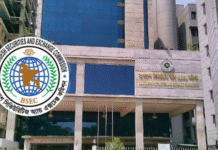The government has exhausted its net borrowing target for the fiscal year of 2019-20 from the banking system in just six months (July-December) with the net borrowing reaching Tk 48,015.81 crore in the period.
In the budget for the fiscal year 2019-2020, the government had projected to borrow Tk 47,364 crore from the banking sector. The latest borrowing figure shows that the government’s bank borrowing has already exceeded by Tk 651.81 crore with another six months of the fiscal year to spare.
According to Bangladesh Bank data, the government’s net outstanding borrowing from the banking sector increased to Tk 1,56,111.51 crore at the end of December 2019 from Tk 1,08,095.7 crore on June 30, 2019.
Policy Research Institute executive director Ahsan H Mansur told New Age that the government’s bank borrowing would exceed Tk one lakh crore at the end of the current fiscal year mainly for the dismal revenue collection and sharp fall in sales of national savings certificates.
Revenue collection by the National Board of Revenue fell short of target by Tk 26,876 crore in the first five months of the fiscal year 2019-2020.
The NBR managed to collect Tk 83,692 crore in July-November of FY20 against a collection target of Tk 1,10,568 crore for the period.
Apart from the dismal revenue collection, the sales of NSC, another source of borrowing money for the government, also dropped significantly.
During July-November of FY20, net sales of NSCs dropped by 73.03 per cent to Tk 5,841.64 crore from Tk 21,661.93 crore during the same period of last fiscal year.
To get rid of the money crisis for the implementation of budget, the government has drafted a law to ensure submission of money of different government entities including autonomous, semi-autonomous and statutory bodies to the government exchequer.
As per a statistics, the agencies have over Tk 2.18 lakh crore deposits on their own accounts and the finance ministry was hopeful to get at least Tk 30,000 crore from the agencies by the current fiscal year.
Economists cautioned that the government’s high borrowing from the banking sector has squeezed credit flow to the industries.
Lower credit flow to the private sector would ultimately hamper industrial expansion thus resulting in unemployment along with social disparity, they said.
A total of 26.77 lakh people were unemployed in the country in the fiscal year of 2016-17, said state minister for labour and employment Begum Munnujan Sufian in parliament in February, quoting a manpower survey conducted by the Bangladesh Bureau of Statistics.
The rate of unemployment among educated youth is 33.2 per cent in the country with higher concentration of joblessness among the graduates and post-graduates, according to a Bangladesh Institute of Development Studies report published on December 1.
In November 2019, private sector credit growth, a determining factor of the country’s industrial expansion, dropped to a record low at 9.87 per cent against the Bangladesh Bank’s projection for a cautious 14.8 per cent growth in FY20.
‘A very poor state of revenue collection and a drastic fall in the sales of national savings certificates due to the taxation measures have forced the government to borrow from the banking sector,’ former interim government adviser AB Mirza Azizul Islam told New Age recently.
Heavy borrowing from the banking sector by the government would squeeze further the banks’ scope for lending the private sector, Mirza Aziz said, adding that the businesses would not be able to expand their business if they failed to avail required funds.
‘Employment generation by the industrial sector would fall further if the sector fails to utilise their existing capacity by importing raw materials, where banks’ credit is a major factor,’ he said.
Even though lending to the government would not be a matter of concern for the banks as such lending is more secure against private sector lending that involves high risk of defaulting, he said.
‘Earnings of the banks would be lower but issuing credit to the government is risk-free investments for the banks.’
However, such lending by the banks is unexpected if the interest of the country’s economy gets priority, he said.
In the budget for FY20, the government has planned to borrow Tk 63,848 crore from overseas sources and the rest Tk 77,363 crore from domestic ones to meet Tk 1,45,380 crore deficit financing.
The government’s bank borrowing trend in the six months of this fiscal year (July-December) indicates that its actual borrowing in the entire fiscal year might exceed Tk one lakh crore as 73.64 per cent of the government’s annual development programme is yet to be implemented.
The government’s net borrowing from the banking sector was Tk 19,800.9 crore in the entire fiscal year of 2018-2019 while it repaid Tk 1,073.13 crore to the banks instead of borrowing from the banks.
The government repaid Tk 18,405 crore and Tk 2,851.2 crore in FY17 and FY18 respectively against its borrowing from the banking sector.









